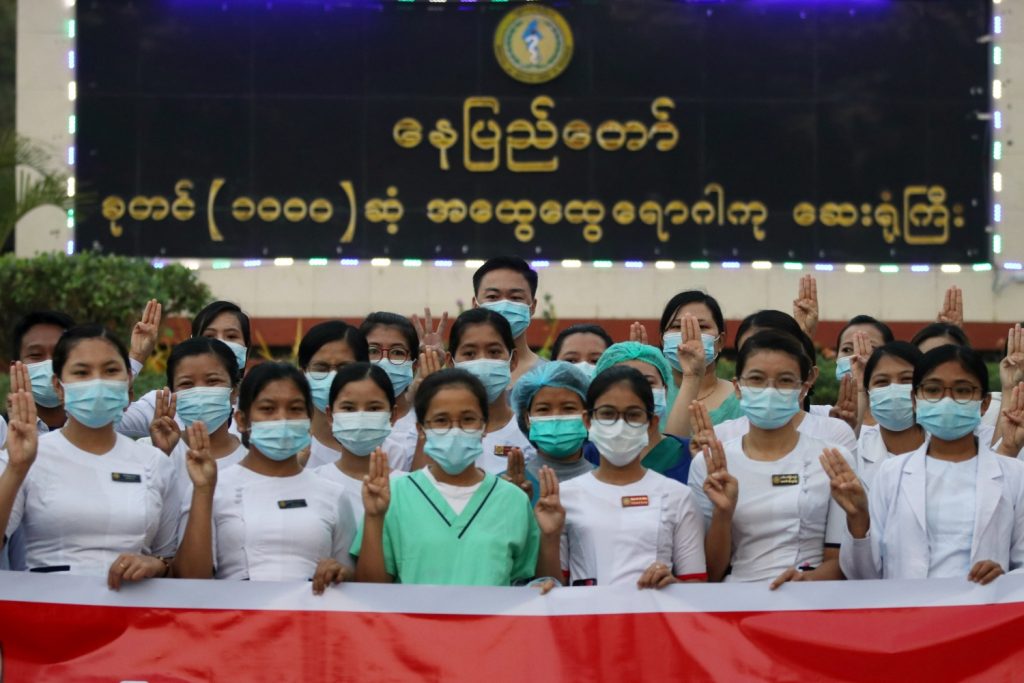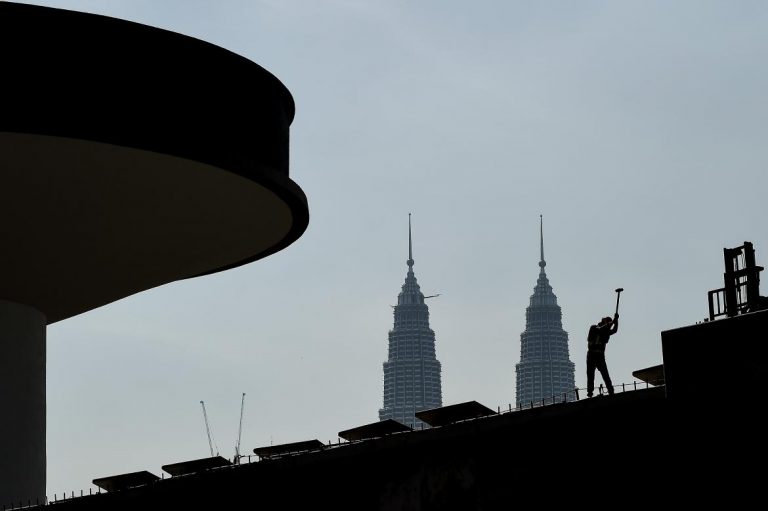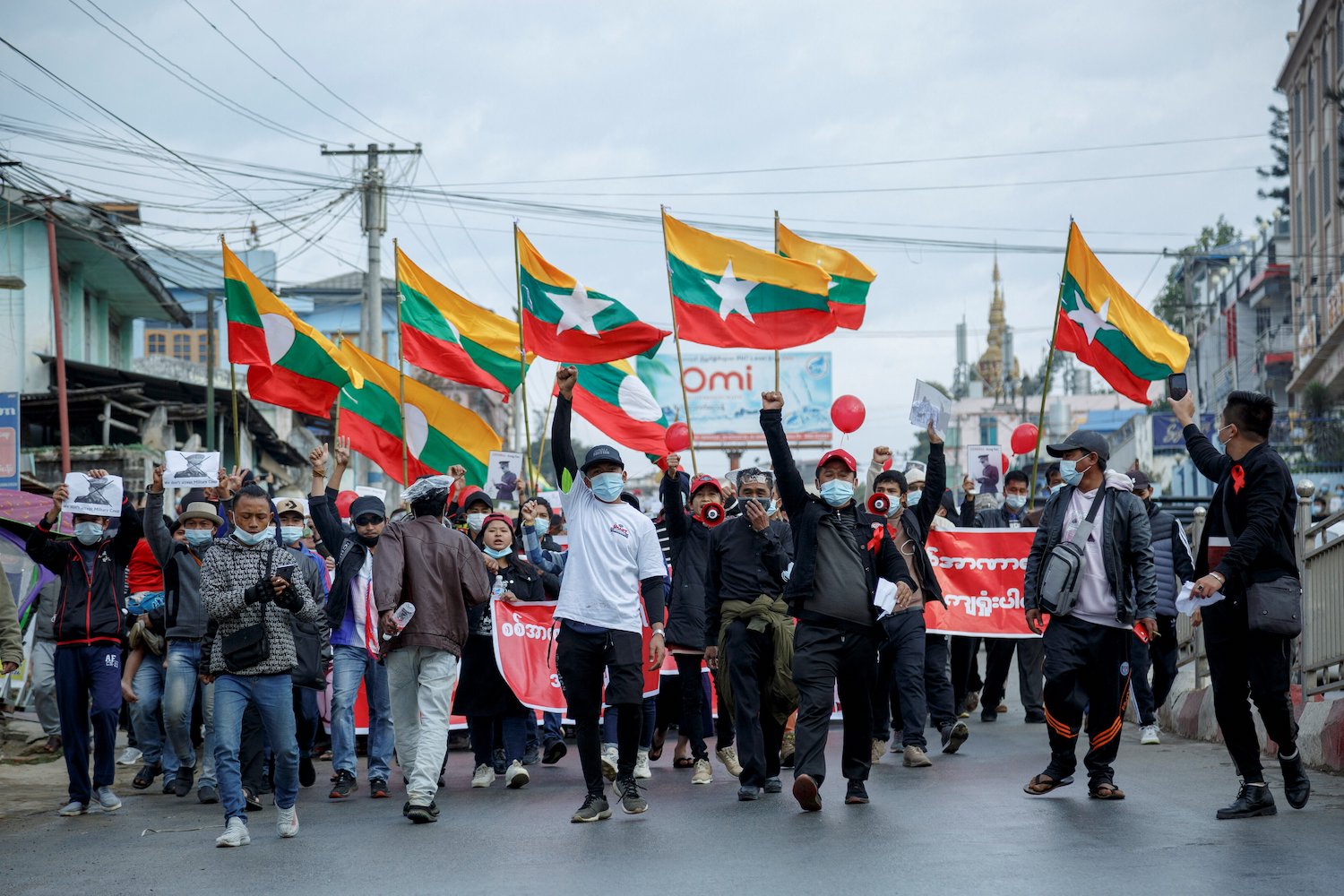Staff at state hospitals and medical departments are reporting harassment from their bosses and police scrutiny for joining a growing strike to oppose military rule.
By FRONTIER
Striking government health workers say they are facing intimidation and threats of dismissal from their superiors as the civil disobedience campaign against Monday’s military coup completed its second day yesterday.
As of today, a large portion of staff are refusing to go to work at 91 state hospitals and more than two dozen medical colleges and government health departments in close to 80 towns across Myanmar, according to the campaign’s Facebook page, which has more than 200,000 followers. They have been joined in their campaign by state schoolteachers from seven education unions, staff at state carrier Myanmar National Airlines, and civil servants at a growing number of government departments.
All participants in the campaign who spoke to Frontier requested anonymity, fearing reprisals from the government.
A doctor who is one of the leaders of the campaign, whose members have signalled their participation by pinning red ribbons to their chests, told Frontier that striking nurses are facing some of the worst pressure from their bosses.
“In Thingagyun Township Hospital [in Yangon], the head nurse ordered the [striking] nurses to move out of staff housing, saying that if they refused, they would be forcibly evicted,” the doctor said, adding that this would make the majority of the nurses who come from outside Yangon homeless. “But the nurses are resisting, saying that if they try to [evict them], they will livestream it [on social media]. So, there is a stalemate at the moment.”
He said that no matter what difficulties striking medical workers face, they will continue to protest the military government in a non-violent way.
To protect those taking part in the campaign, Facebook users created a page on Wednesday called Public Shaming of Unethical Professionals, on which senior staff who are alleged to have intimidated workers are publicly shamed. Yesterday morning a letter purportedly from Dr Su Su Dwe, the superintendent of Mandalay General Hospital, was leaked on the page to a barrage of outraged comments. In the letter, dated February 2, the superintendent instructs all departmental heads to submit the names of staff who are not reporting to work, for reasons that were not stated.
According to sources in the medical community, Su Su Dwe is the sister of Tatmadaw officer Lieutenant General Aung Lin Dwe, who is the general secretary of the State Administration Council that the military established after the coup to oversee government administration.
Some of those on strike have also reported scrutiny from the police. An assistant surgeon from Yangon General Hospital told Frontier that, according to a colleague, police officers visited the hospital yesterday to collect the names of medical workers who were part of the campaign, for a purpose that was not clear.
The new junta has also expressed its displeasure publicly. The Tatmadaw’s True News Information Team issued a statement yesterday afternoon urging doctors to follow the ethics they had sworn to uphold on graduation, and inviting the public to visit military hospitals for treatment. The statement also said the striking health workers had been influenced by “saboteurs”, causing public health services to be “disrupted”.
The statement has since been removed from the Tatmadaw commander-in-chief’s website, following social media comments claiming that it proved the campaign was effective.
However, not all participants in the civil disobedience campaign report being intimidated. An assistant surgeon from the 1,000-bed Nay Pyi Taw General Hospital said that while she had heard of doctors in Yangon and Mandalay facing pressure from their superiors, including in staff chat groups on the popular messaging app Viber, she and her colleagues at the Nay Pyi Taw hospital had been spared.
“There is no direct pressure on us so far. But I heard the higher-ups are making [departmental] heads submit daily attendance lists,” she told Frontier yesterday.
A striking lecturer at the University of Medicine 2 in Yangon said yesterday that while most of her fellow lecturers were refusing to go to work, “the rector has not said anything so far”. She explained to Frontier that, though classes were not in session, lecturers were still expected to perform administrative duties.
Despite the Tatmadaw’s claim of disruptions to health care, there are mixed reports about the actual impact of the campaign on medical services and government laboratory work.
The deputy director of the National Health Laboratory, Professor Htay Htay Tin, claimed on social media on Wednesday that despite some staff being on strike at the National Health Laboratory, most remained at the laboratory, which he said continues to function smoothly.
The NHL has been the government’s primary diagnostic centre during the COVID-19 pandemic, which the Tatmadaw says it will prioritise during the one-year state of emergency it declared to justify the coup.
In contradiction to Htay Htay Tin’s claims, the assistant surgeon from Yangon General Hospital, which is located close to the NHL, said, “In reality, the National Health Laboratory is facing a crisis because there are almost no staff there. Samples aren’t being tested for COVID-19. It’s not true that the lab is running smoothly as [Htay Htay Tin] said.”
The assistant surgeon also said that public hospitals are having difficulties treating patients because of the campaign.
“In Yangon General Hospital, all 120 assistant surgeons are not going to work, so the higher-ups are having a headache,” he said, adding that some Yangon hospitals are even closing or refusing to accept new patients.
Frontier called Yangon General’s emergency department this morning, posing as a potential patient, and was told it was not taking patients and that people needing treatment should go to another hospital. Frontier also called Hlaing Tharyar Township Hospital in Yangon this morning and received no answer. BBC Burmese reported today that Mawlamyine General Hospital in Mon State had closed its outpatient department, and that it was not accepting new in-patients and would discharge those who were in a stable condition.
The lecturer at the University of Medicine 2 said some striking doctors are continuing to work at private clinics. “We are also referring patients to military hospitals if they seriously need treatment,” she said. “But, I wonder, who would go to them now?”
She implored anyone needing medical care to understand the true intentions of striking medical workers.
“We want our patients to know that we are not refusing to attend hospital because we don’t want to treat people,” she said. “We are [striking] to help our patients because we don’t want a repeat of the old nightmare [under military rule] when we lost patients because there wasn’t enough medicine or medical equipment.”







